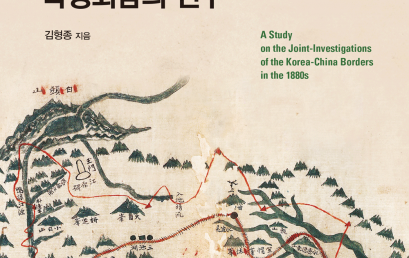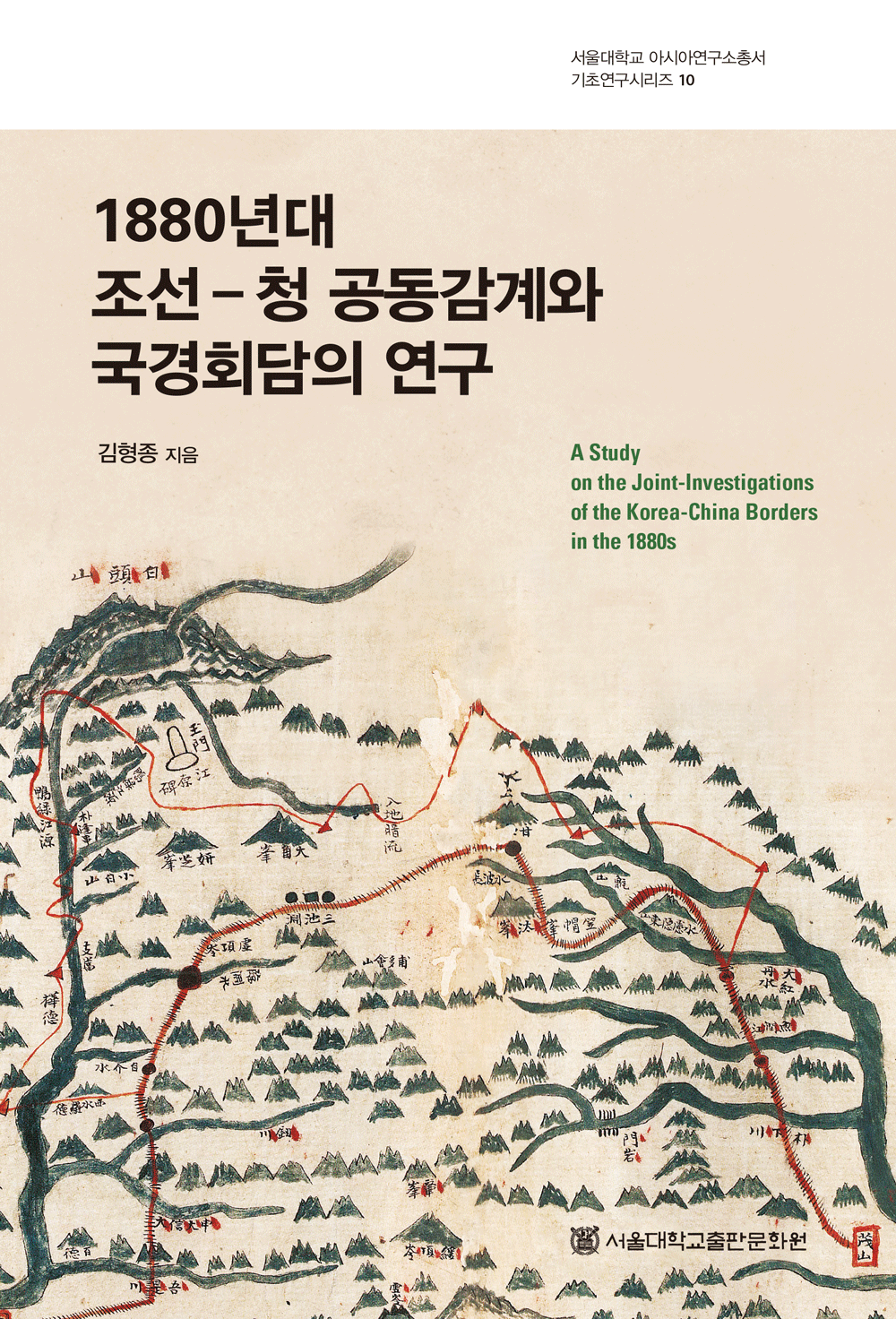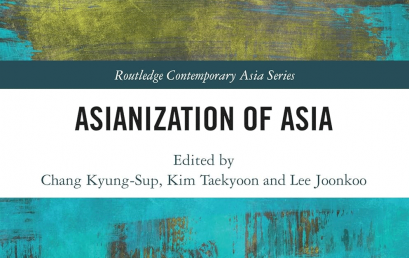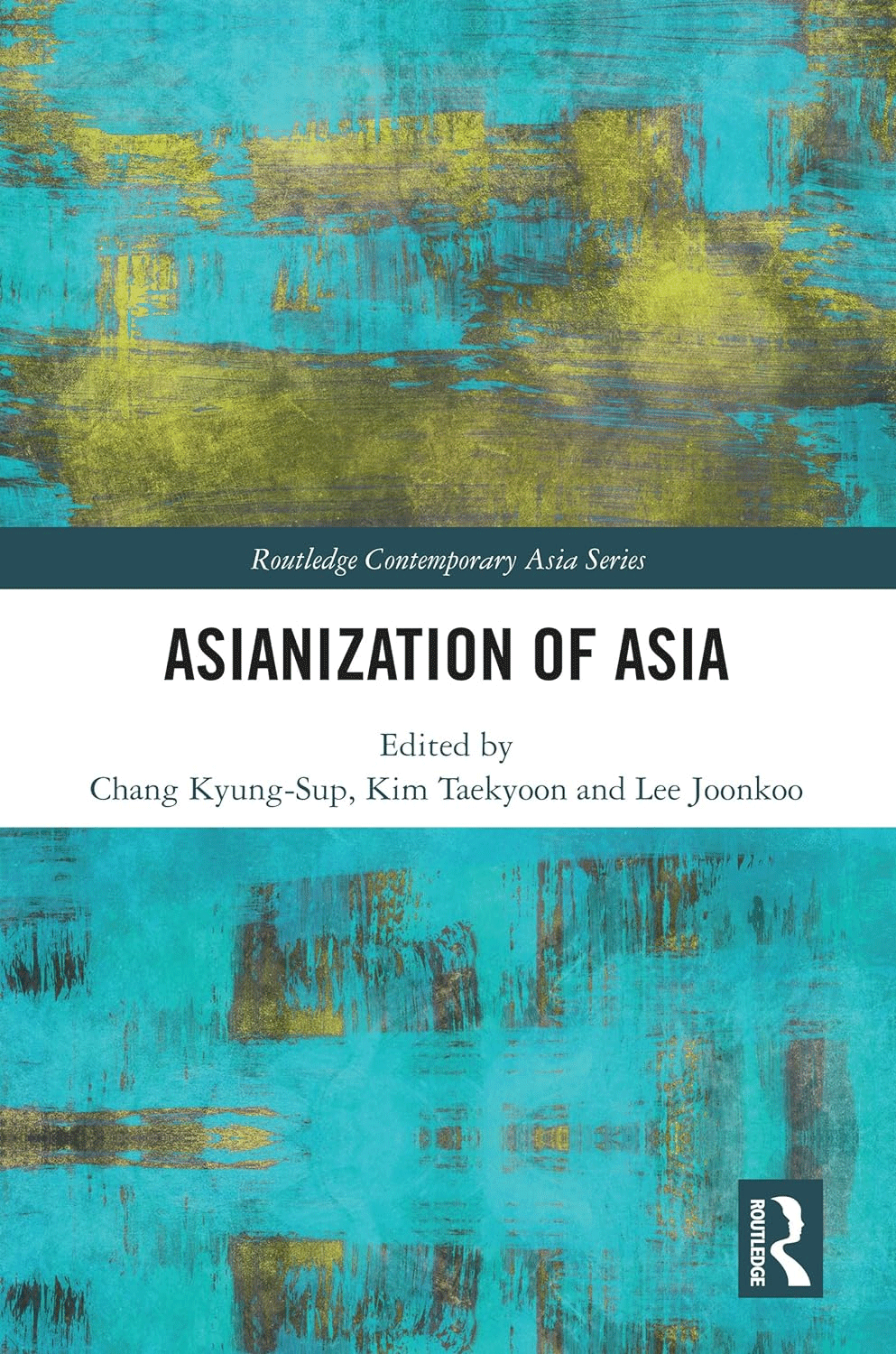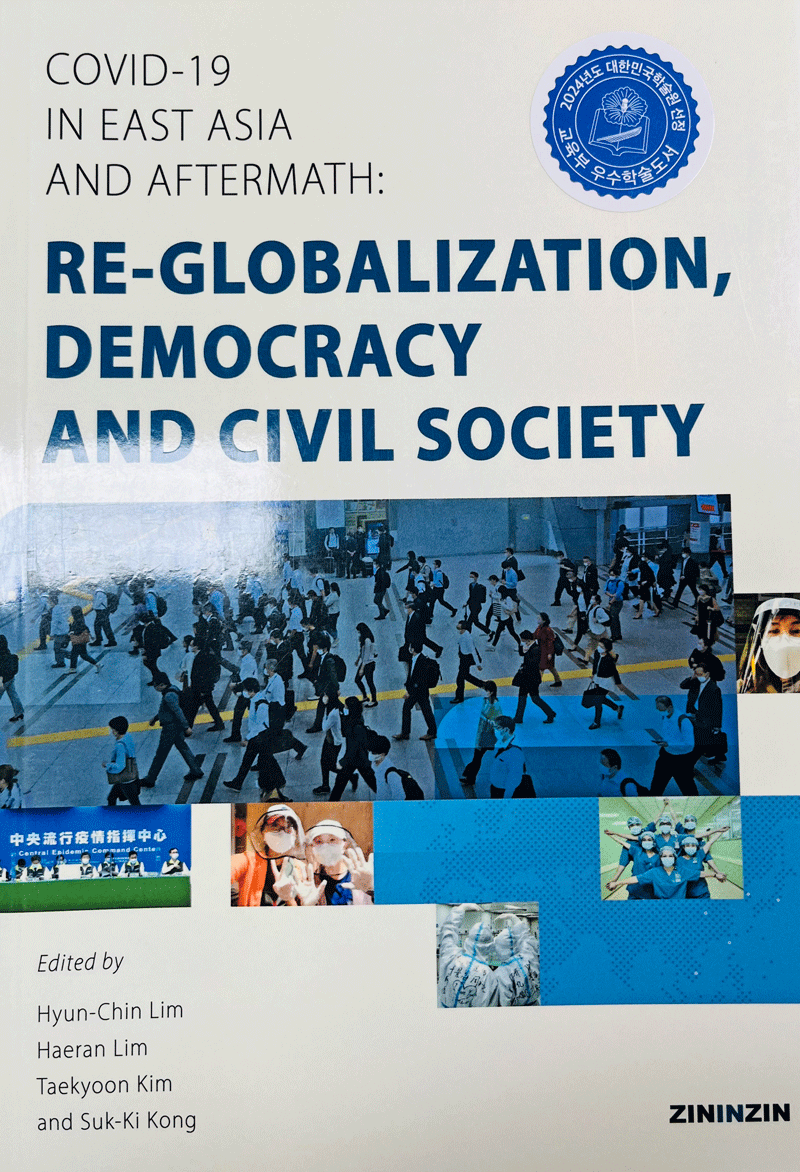

COVID-19 in East Asia and Aftermath- Re-globalization, Democracy and Civil Society
The book project on COVID-19 in East Asia was initiated by the SNUAC Civil Society Program in March 2020, led by Hyun-Chin Lim, the founding director of SNUAC. The project aimed to explore and compare the responses of East Asian countries, including South Korea, China, Japan, Taiwan, and Vietnam, to the COVID-19 pandemic.
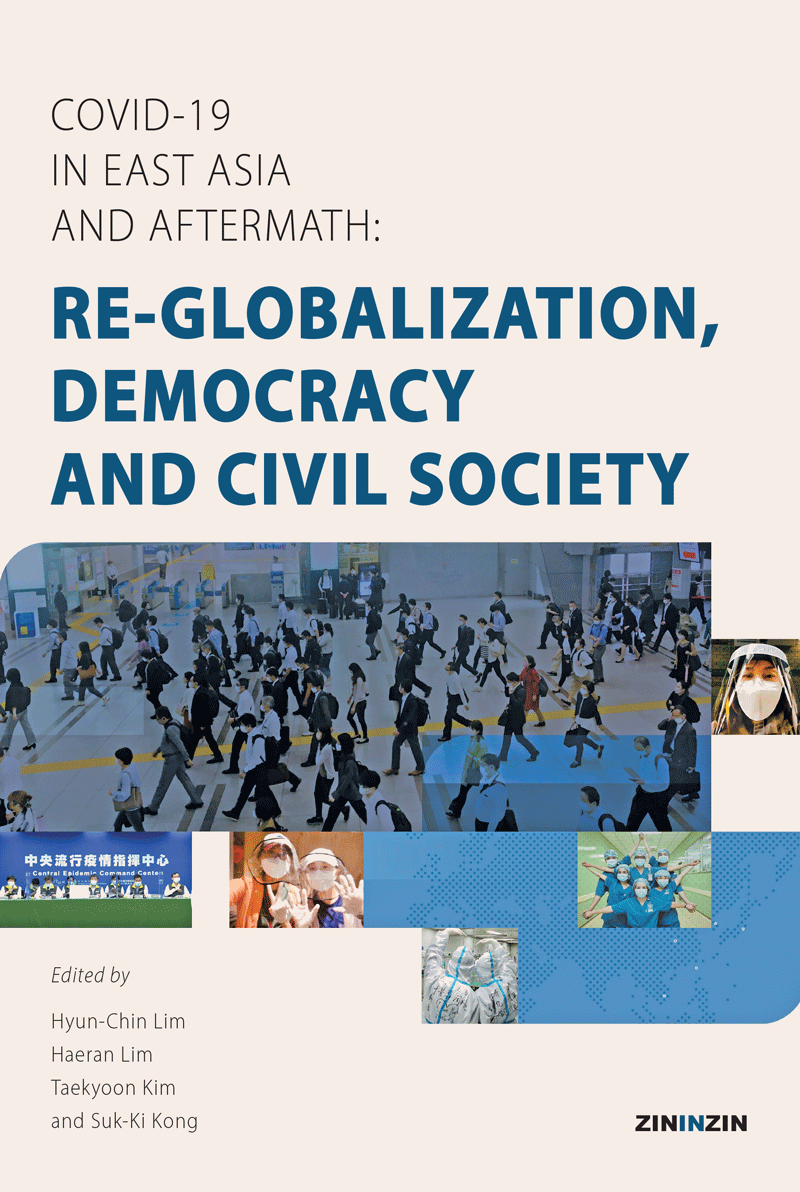

COVID-19 in East Asia and Aftermath- Re-globalization, Democracy and Civil Society
The book project on COVID-19 in East Asia was initiated by the SNUAC Civil Society Program in March 2020, led by Hyun-Chin Lim, the founding director of SNUAC. The project aimed to explore and compare the responses of East Asian countries, including South Korea, China, Japan, Taiwan, and Vietnam, to the COVID-19 pandemic.
The book project on COVID-19 in East Asia was initiated by the SNUAC Civil Society Program in March 2020, led by Hyun-Chin Lim, the founding director of SNUAC. The project aimed to explore and compare the responses of East Asian countries, including South Korea, China, Japan, Taiwan, and Vietnam, to the COVID-19 pandemic. The organizing committee, including professors Haeran Lim, Taekyoon Kim, and research professor Suk-Ki Kong, conducted a series of hybrid international conferences in May 2021 and February 2022.
The first conference focused on each country’s response to COVID-19, highlighting the effectiveness of South Korean and Taiwanese strategies compared to the US and EU. The second conference addressed the social impacts and transformations in the post-pandemic era, recognizing that East Asia was not immune to global changes.
The book consists of two parts: the first part analyzes the diverse responses to COVID-19 in East Asian countries, while the second part explores the political, economic, social, and cultural impacts of the pandemic. The authors examine key issues such as the retreat of democracy, digital surveillance states, the return of the state, re-globalization, platform economy, precariatization of labor, untact societies, empathic civilization, nationalism, nativism, populism, and US-China rivalry.
The COVID-19 pandemic increased the power of illiberal political leaders and led to the retreat of democracy in some cases. Digital platform economy and gig economy rapidly expanded, transforming labor conditions into precarious and unprotected employment. The pandemic’s aftereffects continue to affect social minorities, care and education sectors, self-employed individuals, and platform workers.
Despite the official end of the pandemic, East Asia remains exposed to global risks such as the Ukraine crisis, climate change, and the Fukushima contaminated water issue. The authors emphasize the importance of continued research on COVID-19 and its wide-ranging impacts, from quarantine measures to socioeconomic protection. They hope that this research contributes to addressing the ongoing risks and threats in East Asia.
Contents
Tables and Figures v
Acknowledgements ix
Notes on Contributors xiii
Introduction:
Chapter 1. East Asia after COVID-19: Re-Globalization, US-China Rivalry, and Global Value Chains
Hyun-Chin Lim 3
Part I Return of State and Retreat of Civil Society
Chapter 2. The Transformation of Political and Economic System in Covid-19 Era: The Decline of Neoliberalism and the Return of the State in the World and South Korea
Hyug Baeg Im 25
Chapter 3. The Responses to and Impacts of COVID-19 in Taiwan: The Interplay of State and Society
Michael Hsiao 49
Chapter 4. The World after COVID-19: Democratic Recession, Economic Inequality, and the Return of the State
Haeran Lim 65
Part II Varieties of Strategies to Respond COVID-19 Pandemic in East Asia
Chapter 5. Different Patterns of the COVID-19 and Different Response Strategies in China, Korea and Japan
Ik-Ki Kim 81
Chapter 6. Changes in COVID-19 Countermeasures and Issues of Risk Governance: February 2020 to September 2021
Tatsuro Niikawa 109
Chapter 7. The Government’s Response and People’s Social Responsibility during the COVID- 19 Pandemic in Viet Nam
Minh Huu Nguyen 129
Part III New Challenges and Striving Over Platform Economy and Unequal Social Impacts
Chapter 8. The Emergence of Digital Economy and Fintech in the Post Pandemic Era: Implications for East Asia
Wang-Hwi Lee 171
Chapter 9. The Impact of the COVID-19 Pandemic on Aspects of the Lifeworld of South Korean People
Jonghoe Yang 189
Chapter 10. Reclaiming Democratic Citizenship After Tackling the COVID-19 in South Korea
Suk-Ki Kong 215
Conclusion:
Chapter 11. Governance Failure in Global Health Crises and Prospects of Collective Action for Resilience in Asia: In Search of Democratic Middle Powers
Taekyoon Kim 241
INDEX 269
Notes on Contributors
Hyun-Chin Lim (hclim@snu.ac.kr)
Hyun-Chin Lim is Professor Emeritus of Sociology and Director of Civil Society Programs,
Asia Center, at Seoul National University. He is also an elected member of the
National Academy of Sciences, Republic of Korea. Currently, he serves as President of
East Asian Sociological Association. He received his B.A. and M.A. in Sociology from
Seoul National University, and his Ph.D. in Sociology from Harvard University. He was
previously the dean of Faculty of Liberal Education, the dean of the College of Social
Sciences, and the founding director of Asia Center, all at Seoul National University. His
books include Mobile Asia, Global Capitalism and Culture in East Asia, Capitalism and
Capitalisms in Asia, and Asia on Rise: Civilizational Turn.
Hyug Baeg Im (hyugim@naver.com)
Hyug Baeg Im is currently Professor Emeritus, Korea University. He received Ph.D.
from the University of Chicago. He had been the Chaired Professor, Gwangju Institute
of Science and Technology, the Dean of Graduate School of Policy Studies, Korea University.
He served as an EC member of IPSA, 2009-2014. He had taught as a visiting
professor at Georgetown University (1995-1996), Duke University (1997), Stanford University
(2002-2003) He has been awarded Best Academic Award from Korea Academy
of Science (2015), ICAS Best Book Prize (2017), and Best Academic Achievement Award
from Korean Political Science Association (2010). His recent publications include, Democratization
and Democracy in South Korea, 1960-Present (Palgrave Macmillan, 2020),
The Possibility of Peace in the Korean Peninsula (SNU Press, 2017), and The Origins of
Yushin: Machiavelli Unveiled (Harvard Univ. Press, 2011).
Hsin-Huang Michael Hsiao (michael@gate.sinica.edu.tw)
Hsin-Huang Michael Hsiao is Adjunct Research Fellow/Professor of Institute of Sociology,
Academia Sinica; Chairman of Taiwan-Asia Exchange Foundation; Chair Professor
of Hakka Studies, National Central University; and Senior Advisor to the President of
Taiwan since 2016. His current research areas include: middle class, civil society and
democracy in Asia; social transition to de-carbonized society in Taiwan; comparative
Hakka studies in Taiwan and Southeast Asia. His most recent book publications are:
Writing Taiwan’s Third Sector History (co-editor, 2023); Three Divides: Transformation of
Hakka Ethnic Politics in Taiwan (co-author, 2022); The Many Faces of Taiwan’s Cultural
Diplomacy (co-editor, 2022); The Ethnic Relations of Hakka Belts in Taiwan and Malaysia
(co-editor, 2022); China Impact: Attitude Changes in Taiwan and Hong Kong (co-editor,
2022), and The Volatility and Future of Democracies in Asia (co-editor, 2022).
Haeran Lim (hrlim@snu.ac.kr)
Haeran Lim is a Professor at the Department of Political Science and International
Relations, Seoul National University. She specializes in comparative politics, East Asian
and international political economy. Formerly, she was the vice-president of the Korean
Political Science Association (2019), the director of the Institute of Korean Politics at
SNU (2010-2012), visiting fellow at Brookings Institute (2007-2008). Her research interests
include political economy of industrial policy and transformation, and globalization
and trade policy. She has published numerous papers and books, including International
Political Economy and East Asia, Revisiting East Asian Developmental Model, Crisis of Democracy
and Economic Reform in Korea, Democratization and Transformation Process
of Developmental States, and Korea’s Growth and Industrial Transformation (Macmillan)
among others.
Ik Ki Kim (ikki@dongguk.edu)
Ik Ki Kim is currently director of East Asia Well-Ageing Research Center in Korea. He
used to be a professor of sociology at Dongguk University. After retirement he taught at
Renmin University of China for 4 years as a Xin’ao International Outstanding Professor.
He received BA at Seoul National University and MA at the University of South Carolina,
then got Ph.D in sociology at the University of Michigan. His main research area
is East Asia, mainly comparing current situations in Korea, Japan and China. His recent
publications also deal with East Asia including “Comparison of participatory activities of
the urban elderly in Gyunggi Province(Korea) and Shandong Province(China).”, “China,
South Korea, Japan and Covid-19”, and ‘Beijing and Seoul, Modern to Hypermodern’.
Tatsuro Niikawa (tniikawa@mail.doshisha.ac.jp)
Tatsuro Niikawa is Professor Emeritus of Doshisha University. He is also Visiting Professor
of Research Institute for Humanity and Nature. He was former Professor of Public
Policy at Graduate School of Policy and Management of Doshisha University. He studied
political science at the Graduate School of Political Science of Waseda University. His
major fields of research are the study of government, governance, public administration,
public policy analysis, citizen participation and social innovation. His publications and
East Asia after COVID-19: Re-Globalization, the US-China Rivalry, and Global Value Chains
research articles focus on local government and governance, deliberative democracy and
participatory decision making, social enterprise and business, civil society organization
and citizen advocacy in Japan and comparison with other democratic countries.
Nguyen Huu Minh (minhnguyen.ifgs@gmail.com)
Nguyen Huu Minh (Ph.D in Sociology, University of Washington, USA) is Professor of
Sociology, the President of Vietnam Sociological Association; a High Senior Researcher
of the Institute for Family and Gender Studies (IFGS), Vietnam Academy of Social
Sciences. He was Director of the IFGS (2005-2017), Vice-Director of the Institute of
Sociology (1999-2005). Some of his recent books, book chapters (and co-author) include:
Vietnamese family in the context of industrialization, modernization and integration
from comparative approaches (Social Sciences Publishing House-SSPH, Ha Noi. 2014);
Gender dimensions of social exclusive towards a more comprehensive policy for women
(SSPH, Ha Noi. 2017); “Care Relations among Non-coresident Families”, in Wongboonsin
and Tan (Editors): Care Relations in Southeast Asia: The Family and Beyond
(Brill Publisher. 2019).
Wang-Hwi Lee (leew@ajou.ac.kr)
Wang Hwi LEE, Ph.D. (London School of Economics and Political Science), is professor
of political science at Ajou University, Suwon, South Korea, where he has taught international
political economy since 2006. This year, he is a vice president of Korea Association
of International Studies (KAIS). Currently he advises the Ministry of Foreign Affairs,
Ministry of Industry, Commerce and Energy, and Ministry of Science and ICT on economic
security issues. His research interests have been focused on issues of the political
economy of East Asia and the US-China strategic competition. He is the author of “The
Politics of Economic Reform in South Korea: Crony Capitalism after Ten Years”, “Pulling
South Korea away from China’s Orbit: The Strategic Implications of the Korea-US Free
Trade Agreement”, “ US-China Cooperation on Climate Change at COP26 – Policy
Implications for Environment and Energy”, and “Crisis Management of the COVID-19
Pandemic in South Korea, Taiwan, Hong Kong, and Singapore.”
Jonghoe Yang (jhyang@skku.edu)
Jonghoe Yang is Professor Emeritus in the Department of Sociology, Sungkyunkwan
University, Seoul, Korea. He was President of the Korean Sociological Association in
2005. He published both books and articles on such topics as development and change,
sociology of culture and arts, environmental consciousness, and middle class. His recent
publications include Development, Class, and Culture: Aspects of Socio-cultural Change
in Modern Korea (2012, Green), Citizenship and Migration in the Era of Globalization
(co-editor, 2013. Springer), and Global Capitalism and Culture in East Asia (co-editor,
2019, Baiksan).
Suk-Ki Kong (skong@snu.ac.kr)
Suk-Ki Kong is Research Professor of Asia Center at Seoul National University. He studied
sociology and received B.A., M.A. from the Department of Sociology at SNU and his
Ph.D. from the Department of Sociology at Harvard University. He is also Adjunct Professor
of Graduate School of Public Policy and Civic Engagement at Kyung Hee University.
His major fields of research are social movements, human rights, civil society and
social economy. His publications and research articles focus on social movements, civil
society, democracy and citizenship, local community and resilience, and social economy
in East Asia as a comparative context.
Taekyoon Kim (oxonian07@snu.ac.kr)
Taekyoon Kim is professor of international development in the Graduate School of
International Studies, Seoul National University. He is currently working for the SNU
Social Responsibility as the Chair, as well as the Prime Minister Office’s Committee on
International Development Cooperation as a Board Member. His scholarly works cover
international development, Global South studies, peace studies, and international political
sociology.
